Five Australian swimmers aiming to rewrite history at the Paris 2024 Olympics
No Australian female swimmer has ever swum at five Olympic Games, while no male has even made it to four. But this could all be about to change at the Paris 2024 Olympics.
VWeekend
Don't miss out on the headlines from VWeekend. Followed categories will be added to My News.
Gold has always been the colour that Australian swimmers aspire to. The universal symbol of sporting success, it’s also the standard Australia’s swimmers accept when they first make the national team.
In the same tradition as cricket’s baggy green cap, everyone who gets selected for the Dolphins receives a gold pin and a unique number representing their place in the order of everyone who has swum for Australia.
It’s a rare and distinguished club of just 850 Australians.
Fred Lane is pin recipient #1. He won Australia’s first two Olympic gold medals, at Paris in 1900. An automatic induction into Swimming Australia’s Hall of Fame, Lane only swam at one Olympics, which is very much the norm in a sport where longevity is uncommon. Surprisingly, only three Australian women – Leisel Jones, Emily Seebohm and Cate Campbell – have swum at four Olympics. And no Australian man has so far managed the feat.
But that could all change at next year’s Olympics, which are returning to Paris for the third time because Cam McEvoy and Mitch Larkin are both hoping to go to their fourth Olympics.
So too is Bronte Campbell, while her older sister Cate is hoping to go to an unprecedented fifth Olympics, along with Seebohm. If they make the team for Paris aged 32, they’ll become the oldest female swimmers to represent Australia.
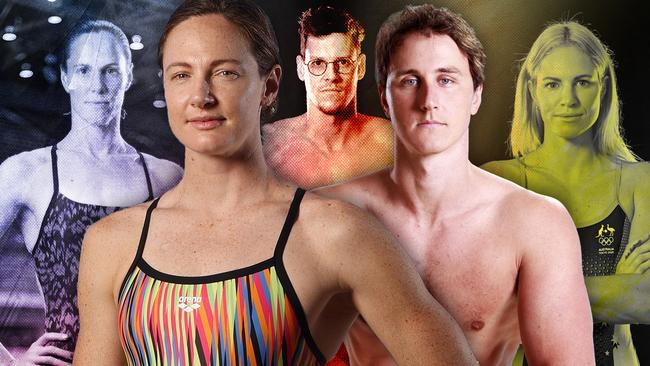
It’s extremely rare for any swimmer to represent their country after they turn 30 but it has been done before.
Lisa Curry won four gold medals for Australia at the 1990 Commonwealth Games in Auckland after returning to the pool as a new mother, aged 30.
The record for the oldest Australian Olympic swimmer belongs to Frank Beaurepaire, who was 34 at the 1924 Olympics.
Once notorious for having a high dropout rate, swimming has become much better at retaining its most talented competitors.
“It’s a very tough sport because you have to keep performing to stay in there but we’ve listened to the athletes and worked with them,” Australian head coach Rohan Taylor says. “They know what it takes and they’re all committed to it. We all want to see them succeed.”
Swimming Australia’s high performance director Tamara Sheppard says: “I don’t think (age) is the challenge, it’s more about the athlete understanding their body better and what they need to do to get there.”
While they’ve all accomplished amazing things, the odds are still stacked against each of the five veteran Australian swimmers gunning for history next year because they’ve all suffered setbacks and disappointments. It’s a testament to their talent, perseverance and dedication.
CAM MCEVOY – ‘I WANT TO GO TO SIX OLYMPICS’
If Cam McEvoy’s theory is proven right, Australian swimming fans will see a lot more of him in the future.
Looking more buff than ever, not only is McEvoy bigger than he’s been before after packing on an extra 10kg of muscle, but he’s also planning to stick around a lot longer than he originally planned.
A physicist and mathematician as well as a swimmer, McEvoy is experimenting with a new radical approach to training that he believes will prevent burnout and produce faster times. If his instincts are correct, he could become the first Australian male to swim at four Olympics by making the team for Paris next year but he won’t be stopping there.
“That would be a nice little form of success to have but that’s definitely secondary to the curiosity in the approach I’m taking,” he says.
“I’m trying to push the boundaries of sprint freestyle … and potentially do this approach right into my late 30s.
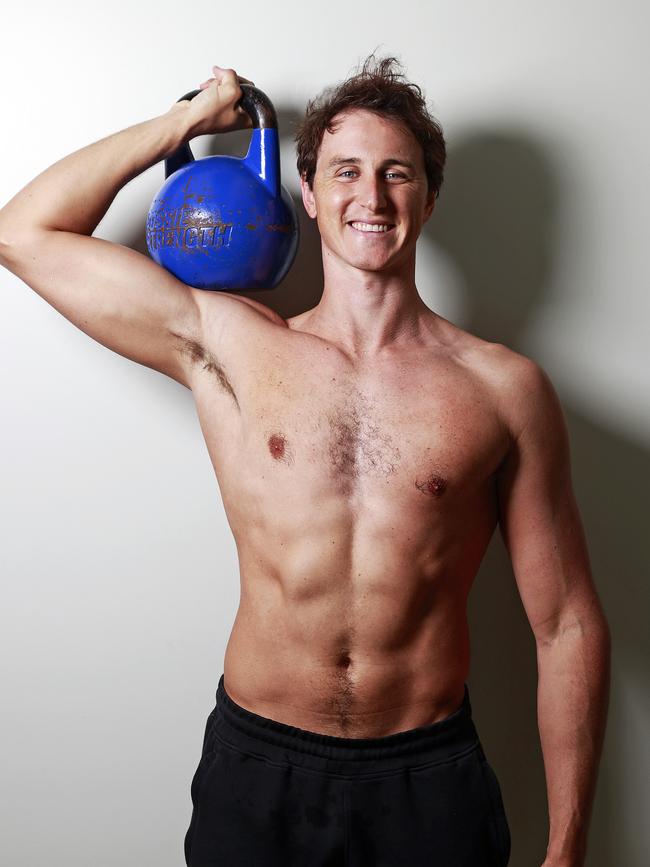
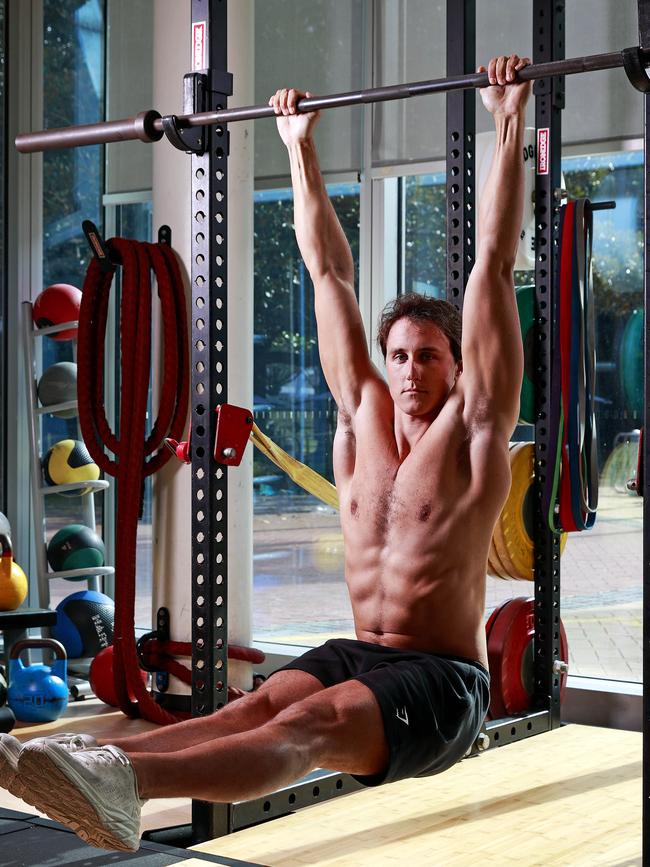
“I’ll be 38 at Brisbane 2032, that would be six Olympics … so the motivation is just to lay down the framework right now, see how it goes and if it looks good, then just carry it forward.”
Already Australia’s fastest-ever freestyle sprinter and a three-time Olympian, McEvoy is embracing the notion that less is best after questioning the conventional approach to training. Despite competing in the shortest races – 50m sprints that last less than 22 seconds and 100m races that are over in under 48 seconds – McEvoy has been swimming around 50km a week for the past two decades.
The long-held belief is that the key to swimming faster is to spend as much time in the water as possible, but McEvoy is convinced it’s a flawed concept. He found out by accident when he returned to the pool after taking an extended break during the pandemic.
Instead of being slower in the water, McEvoy found he was actually faster the more time he spent on dry land.
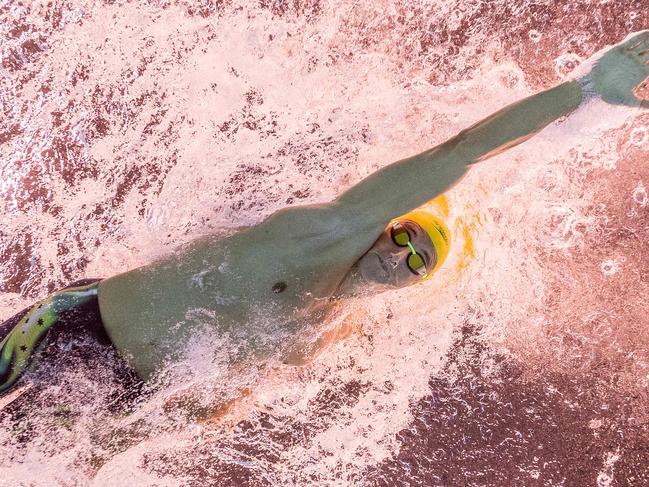
So instead of churning through the laps, he’s been spending more time in the gym, bulking up by doing callisthenics and rockclimbing.
Better late than never, the realisation he could do things differently has given McEvoy a fresh attitude to swimming after he was worn out by the old approach.
“It was also frustrating because I had put in so much time and effort over the last several years working my ass off,” he says.
“Thinking back, there were a lot of counter-productive training efforts.
“But in saying that, if I never went through that, then potentially I never would have been pushed to be in the position I am in now.”
McEvoy’s early results this season are all the proof he needs. He won the 50m freestyle title at the Australian National Championships in April then twice went under the 22-second barrier at the Sydney Open in May.
And if he needs inspiration that swimmers in their 30s can compete at the highest level, he doesn’t need to look far. In 2016 at the Rio Olympics, American Anthony Ervin won the 50m freestyle gold at the age of 35.
“For me, making the fourth Olympics would be huge,” McEvoy says. “And it would be doubly great for me because the approach I have taken towards it has been self-guided in a sense. This is the first time I’ve kind of been the one in the driving seat figuring out the way forward so it would be really gratifying.”
CATE CAMPBELL -’THIS IS IT’
Cate Campbell has already been given a taste of the perfect Olympic send off. In Tokyo, she carried the Australian flag at the Opening Ceremony, exorcised her demons from Rio by winning an individual medal in the 100m freestyle, then topped it off by anchoring two Australian relays to gold.
In high demand in the corporate world, she is already set for life so took 18 months off after Tokyo to stop and smell the roses, indulging in her other passions, including travel, media commentary and sports administration, before the lure of one last Olympics in France became too irresistible so she plunged back into training.
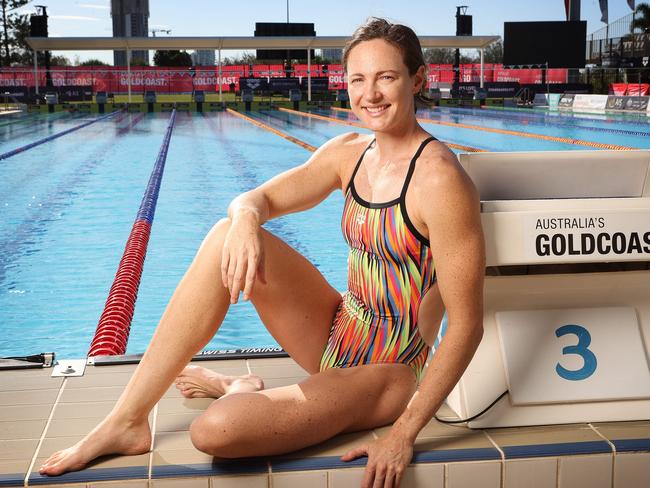
“I’m approaching this Paris Games in a way that I have never approached a competition before, in that I know it will be my last competition. Whatever happens, it will be the last time I can test for an Olympic Games,” she says. “For me, there’s something really beautiful in that because I’m making sure that I make the most of every opportunity that’s coming my way.
“This is it. And it’s my chance to put together everything that I’ve worked for over the past 20 years in the sport and be a part of something incredible one last time, because I feel like, obviously the older you get, the more nostalgic you get, but the more I’ve appreciated my time in the sport as well.”
If that sounds a bit mushy, it’s not.
As the anointed matriarch of the Australian swim team, Campbell has always been pitch-perfect in advocating for her sport, but underneath she’s as fierce and determined as anyone who has ever worn the green and gold cossies.
Campbell is now being coached by Maxine Seear after her lifetime mentor Simon Cusack took on a new role at Swimming Australia.
“I came back to the sport to see how fast I can go one last time, to see if I can put together the perfect preparation and the perfect performance one last time,” she says.
“I am here to challenge myself and to see if I can get the best out of myself and what that looks like. So I will be pushing for the 50m and 100m freestyle.
“Of course, there are no guarantees in sport so if I’m a relay swimmer, I will happily wear that mantle but that is the challenge that I have set for myself, to qualify for a fifth Olympic Games and to qualify for an individual event.”
For all her success, Campbell has also learnt the hard way that nothing is ever guaranteed in swimming. She went to the 2016 Rio Olympics as the hot favourite to win the 100m freestyle after breaking the world record in the lead-up but missed the medals altogether.
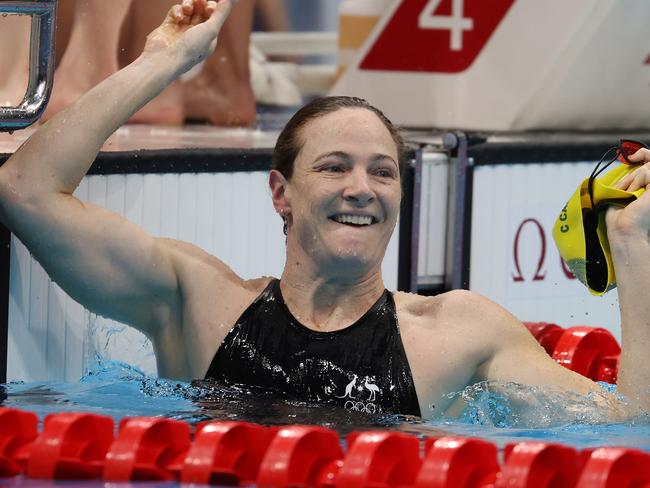
“Every Olympics I go to means a little bit more to me because the older you get, the more struggles you’ve gone through,” she says.
“To have gone to four is beyond my wildest dream and it seems crazy to be throwing my hat in the ring for number five.
“It is a motivating factor to prove that I have this longevity. I think that we often get caught up in people’s achievements and forget that there are some people who have been toiling away for a really long time.
“I have fully come to terms with the fact that I may never walk away from my swimming career with an individual Olympic gold medal. But I can say that I’ve managed to achieve great things throughout my time.”
MITCH LARKIN – ‘REDEMPTION IS MY MOTIVATION’
Mitch Larkin never let on how much pain he was in last year until it was impossible to keep it a secret anymore.
Only a handful of people from his inner-circle knew, but Larkin was in agony for most of 2022 after ripping a muscle clean off his shoulder bone while training.
That he continued swimming without complaining is proof of how brave and tough he is. But he couldn’t hide it forever nor the realisation he needed help.
The first clue that something was amiss was just before the start of last year’s Commonwealth Games in Birmingham when the Dolphins gathered on the pool deck for a team huddle. Hardly anyone noticed at the time but Larkin couldn’t even lift his arm around his teammates.
Larkin bit his lip, defying the pain he was in to win gold and silver medals in the Australian relays. But as soon as the Games were over, he rushed home to see a surgeon, who told him bluntly how serious the injury was.
“The potential for never swimming again was certainly brought up,” Larkin says.
“My surgeon said to me, ‘If you ever want to lift your arms above your head in the next 10 or 20 years, you need to get the surgery right now but there’s no more swimming or racing for a while.’”
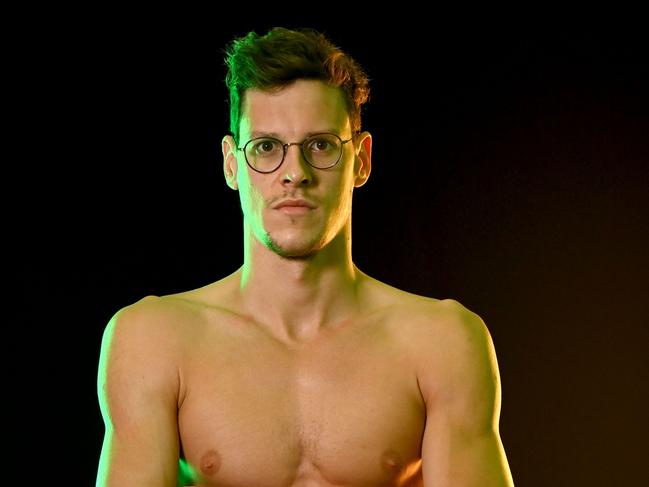
Larkin went under the knife less than a week later. The operation was a success, with the doctors able to reattach the tendons and muscles to the bone. But when he woke up he was warned the recovery process would be slow, very slow.
Three months later, at the end of November, his secret was laid bare to everyone when he turned up at the Hancock Prospecting Annual Awards night in a tuxedo – and a sling.
Still in pain, he hadn’t been able to drive a car or cook a meal for more than 12 weeks, let alone swim at the speed required of an elite, international competitor.
He was only allowed back in the water around Christmas, initially struggling to get through two laps of the pool.
Already an all-time great whose list of achievements included sharing the podium with Michael Phelps when the American finished his last Olympic race, Larkin could easily have called it a day but the lure of competing at a fourth Olympics in Paris was too strong.
“We know the path back is going to be pretty challenging so we started just with 200m, then slowly increased that week by week,” Larkin says.
“I’m back to 7km sessions twice a day now and I’m pretty much pain free, which is really good. But there’s a couple more things that I still need to tweak and obviously get some strength back but I can’t fault the process so far.”
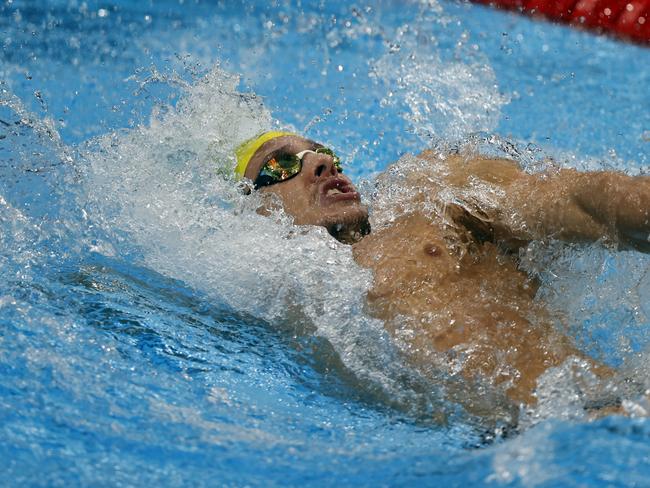
To give himself the best chance of getting to Paris next year, Larkin is already making sacrifices along the way, including skipping the trials for this year’s world championships in Japan.
But if all goes well, he expects to be back to full strength and speed when it matters most and is hoping to swim his ideal program, which includes 200m backstroke and 200m individual medley, for the first time after they were separated on the program for Paris after previously being paired together in the same session.
Larkin won a silver medal in 200m backstroke at the 2016 Rio Olympics but switched to medley for the last Olympics in Tokyo, just missing a spot in the final. But this time he could do both.
“I don’t want Tokyo to be my last Olympics,” he says.
“Coming back from a shoulder injury, my motivation is probably about redemption and getting into the best form that I can.
“Going to one Olympics is incredible and it changes your life, so if I was able to go to four, that would be very special.”
BRONTE CAMPBELL – ‘I’M NOT COMPLETELY DONE’
If Bronte Campbell was a boxer, the fight would have been stopped a long time ago.
You wouldn’t pick it from her ever-buoyant demeanour, but Campbell has been in pain for years, battling chronic injuries to her shoulder, neck and hip.
Already a double world champion in freestyle sprints, a Commonwealth Games champion and two-time Olympic gold medallist, she could easily have walked away after Tokyo with her head held high and her reputation as an all-time great assured. And she very nearly did that, taking an 18-month break to heal her aching body and reassess what she wanted to do. She thought long and hard about retirement but wasn’t ready to give it up yet.
“There was just a little part of me that knew that if I didn’t, then I might always be wondering what that could have been because I didn’t have that feeling that I was completely done,” she says.
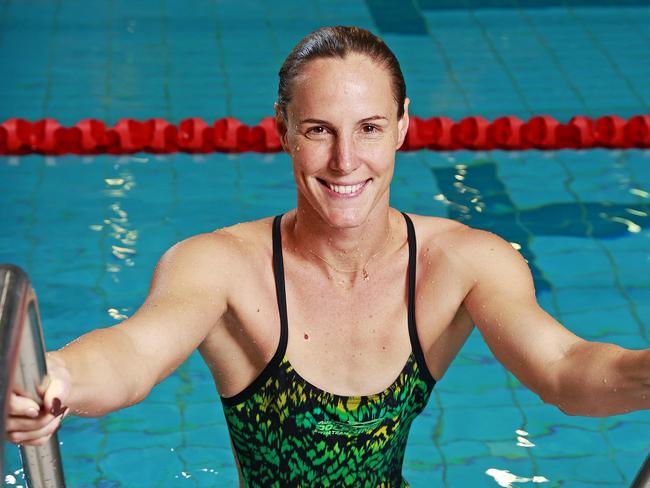
“So I definitely want to keep going until I have the feeling because once that chapter is closed, it’s not being reopened. You can’t go back in time. You can’t go back in age. So, yes, the goal is Paris, but there’s also the secondary goal of knowing I’ve done everything I possibly could in my career.”
Born in the landlocked African country of Malawi, Campbell has already beaten impossible odds.
She wanted to become an Olympic swimmer after watching the Sydney 2000 Games on television before her family emigrated to Australia.
“I never dreamt of being a world champion, which I’ve been lucky enough to do, I’ve never dreamt of being a Commonwealth champion which I was lucky enough to do. The goal was always to be an Olympian,” she says.
“To be able to compete at three of them, and the option to go to four, that’s what excites the seven year old inside of me … because living out your childhood dreams doesn’t happen for everyone.”
Campbell overcame her injuries to earn a place in the Australian relay that won the 4x100m freestyle gold in Tokyo, teaming up with her big sister Cate, Emma McKeon and teenage star Meg Harris.
But she also knows it’ll be even harder to make the team for Paris after the return of Shayna Jack and the emergence of Mollie O’Callaghan, the current individual world champion.
She’s switched coaches to work under Shannon Rollason and knows she faces a daunting challenge but she says she’s up for it, even though she is aware there’re also no guarantees.
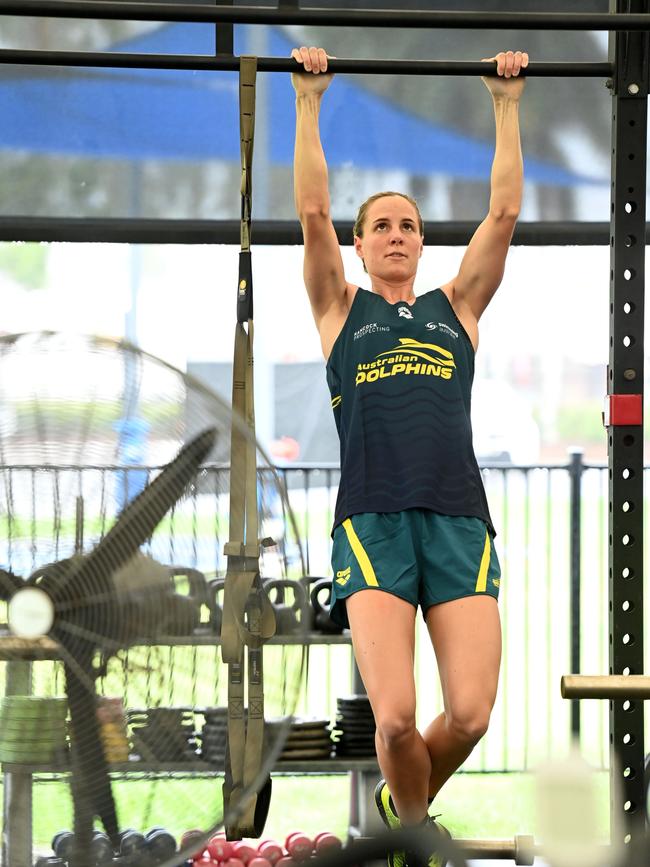
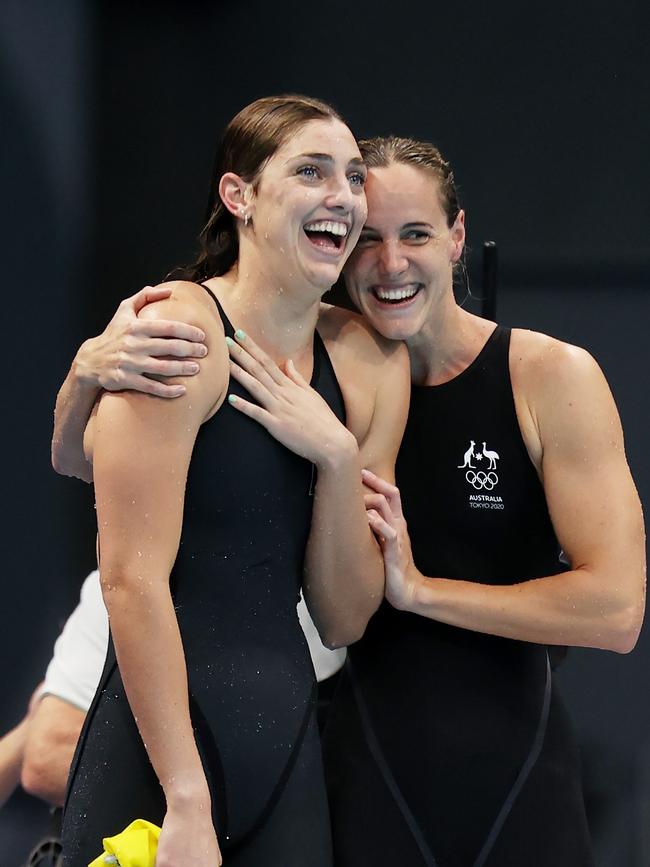
“The 100m freestyle in Australia has got to be the toughest event to qualify for in swimming globally so it’s exciting to be in an event that is that cutthroat and I feel honoured to be part of it,” Campbell says.
“But when I embarked on this journey, I knew that it may not turn out the way I want it to be and I may not even make the team for the Olympics.
“It would be an amazing achievement for me and I honestly think I’d be more proud of qualifying for the team than I would be of any other achievement in my career.”
EMILY SEEBOHM ‘I’M NOT PUTTING PRESSURE ON MYSELF’
True love never dies. In finding her sweetheart out of the water, Emily Seebohm has rekindled her lifelong love in the pool.
Like a lot of great swimmers, Seebohm took a well-earned break from the relentless grind of training after the Tokyo Olympics to explore other interests in her life.
After a record four Olympic appearances and a trophy cabinet overflowing with more than 50 international medals, including three Olympic golds, Seebohm could have retired happily, but there was an unexpected twist.
Not only did she find love on dry land – recently announcing her engagement to reality TV star Ryan Gallagher – but she also rediscovered her passion for swimming.
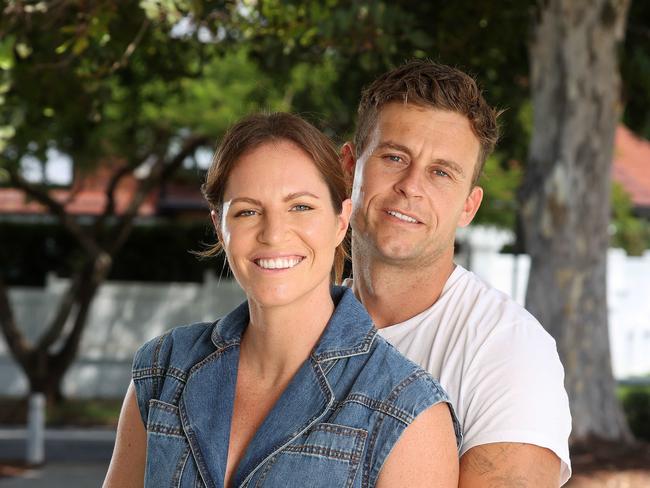
A child prodigy who made her first Australian team at age 14 and swam at her first Olympics at just 16, Seebohm says she isn’t ready to break up with swimming yet, so has set her sights on Paris.
“It’s not that I have anything left that I haven’t done,” she says. “And it’s not to prove a point or anything like that.
“It’s just that I love swimming and I love that it’s something I’m good at.
“I’m not putting any pressure on myself. I’m just going to see how it goes and whatever happens, happens.
“I can’t say that I’m definitely going to make it to Paris because I haven’t been in a competition since Tokyo so it’s a matter of just focusing on myself and seeing what I can do.’’
Every swimmer who makes it to the Olympics has to make great sacrifices. Seebohm is no different.
Her wedding plans are on hold until after Paris and she’s skipped the chance to compete at this year’s World Championships so she can time her run for the 2024 Olympics.
Despite all her past success, she knows that making the Australian team will be extremely difficult. As a backstroker, her chances are even harder because her teammate – Kaylee McKeown – is the world record holder and reigning Olympic champion in both 100m and 200m.
Each country can only send a maximum of two swimmers per event so there are no guarantees, which is why Seebohm is taking a different approach.
Already in her 30s, she knows what it takes so she’s been working closely with Swimming Australia and her master coach Michael Bohl to manage her body and take things slower in order to get faster.
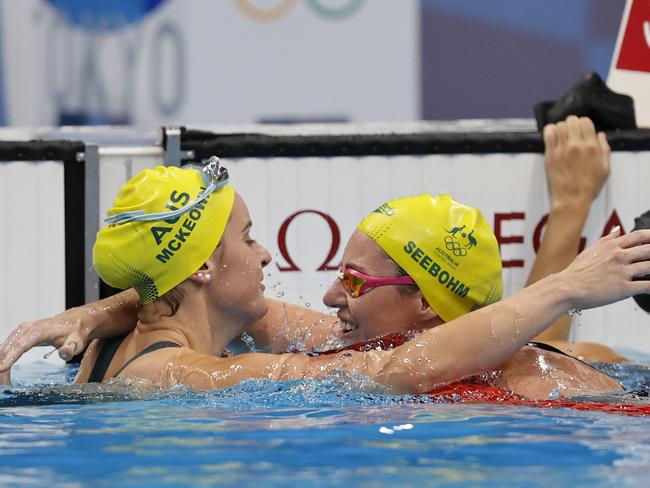
“As you get older and you can listen to your body more and understand things a lot easier, I think you can work out and navigate what works for you in situations,” she says.
“When I was a youngster, I just went along with them because I thought that was what was best for me and it might have been situations where I was sick and I kept pushing through all the training and then I just kept getting more and more sick.
“So it’s a matter of taking into account everything that my body needs and understanding that a lot clearer. Sometimes it will mean more rest. Not just physically, but mentally. It’s draining, too.
“Finding happiness is going to be really important in being able to get to Paris because we need to be mentally prepared for everything that can be thrown at us.
“Covid was a big one … I could have happily retired but having that big break really motivated me as well.”
Originally published as Five Australian swimmers aiming to rewrite history at the Paris 2024 Olympics



